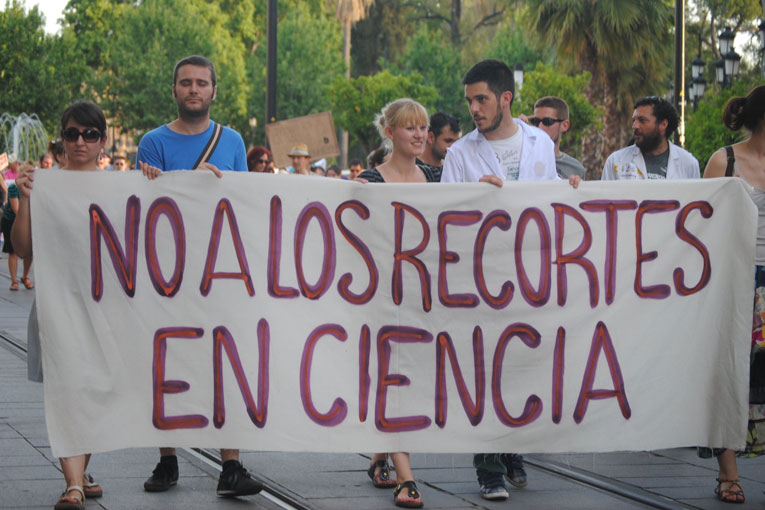
|
In 2003, European Union (EU) countries devoted an average of 1.9% of their GDP to research and technological development (RTD), while the USA and Japan were closer to 3%. The best ones, Finland and Sweden, toyed with 4%. Spain? 0.9%, far from the EU average; even more from the leading positions. But those were times of optimism, because the figure was growing. And then came the good times. In 2009 (the crisis had already started, but we did not know yet, at least officially…) we reached our peak: 1.4%. It was the result of an enormous effort: a 50% growth! There were jobs for brilliant young scientists, money for projects, a great collective excitement was born when it was clear that there was no historical curse preventing Spain from being among the best in science and technology. We rode the wave of success. Until it broke. Public research agencies (CSIC, INIA, CIEMAT, IEO, Carlos III…) suffered budget cuts around 40%! Universities, their regions smothered in public deficit, went through the same thing. Say good-bye to grants and scholarships, Erasmus, Ramon y Cajal, jobs for young scientists… Say good-bye to quality science framework, contribution to international agreements and institutions (What use are ESA, ESRF, CERN…?) Segismundo from «Life is a Dream» would remind us that «Is life a dream at best, and even dreams themselves are dreams». We forgot the classics! Harsh and painful was the awakening. The money to train our best people (a doctor «costs» the country over 100,000 €) is a generous Spanish donation to the countries that embrace them, verifying the Matthew effect: «The rich get richer and the poor get poorer». Spanish language gave the world the word quijotismo (quixotism), meaning nothing else here than brain drain. The time for reflection starts, the time for the analysis of individual and collective behaviour. There must be a culprit, must it not? What are the unbiased causes of the disaster? The outraged, an activating judgeship and citizens who are convinced that a different kind of politics is much needed act against internal causes. For the external ones, there seems to be a guilty entity: the EU! Instructions come directly from Brussels. But the crisis does not abandon us and people lose their temper. «What good is Europe? Let’s get out of the euro!», one can start to hear. And now that we are on the topic, why not getting out of the EU? But first, an important semantic change. The world moves on, and development (TD) was replaced by innovation (I). Let’s go back on topic. The figure devoted to R&I is significant because there is a correlation between its value and other reliable estimators of standards of living. The institutions of this EU –Commission, European Parliament and Council–, whose course a lot of us do not agree with, made clear that the best guarantee for the future of a country is human capital, the quality of its education, research and innovation. The investment –not expense!– on R&I has to increase. The EU sets the example: the next R&I Framework Programme for the period from 2014 to 2020 will receive 70,000 million euros: an increase of 40% from the previous one! (FP7, valid from 2007 to 2013). Just the same as Spain, ha! Now then, why are we not following Brussels direction in this case? |
 Mètode «The EU increased the R&I Framework Programme funding in 40%. Now then, why are we not following Brussels direction in this case?» |
|





